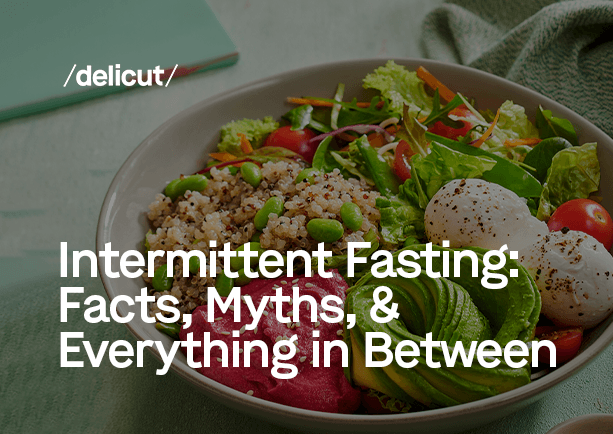Intermittent Fasting: Facts, Myths, & Everything in Between

Globalization has made it easier for lifestyle ideas to travel worldwide. People often adopt these trends without knowing much about them. Intermittent Fasting is one such trend loved by health-conscious people worldwide.
With all its captivating appeal, it has become a global phenomenon among health-conscious individuals, despite many embracing it without substantial knowledge.
It's been hailed as a revolutionary method to achieve weight loss, boost energy levels, and enhance mental clarity. But what is intermittent fasting, and what truths and falsehoods surround this practice? In this comprehensive exploration of intermittent fasting, we delve deep into the facts, debunk the myths, and guide you through everything in between.
Whether you're a seasoned practitioner or a curious newcomer, this blog aims to provide a well-rounded understanding of this increasingly popular dietary pattern.
What is Intermittent Fasting?
Intermittent fasting is an eating approach that involves alternating between periods of fasting and regular meal consumption. It is commonly adopted by individuals aiming to lose weight or regulate their calorie intake. It is not a diet in the traditional sense but rather a scheduled approach to when you consume your meals.
How Does Intermittent Fasting Work?
Intermittent fasting shifts your body's metabolic state from the fed state to the fasted state. During the fasting periods, when your body is not processing food, it utilizes stored energy (glycogen) and begins to burn fat for fuel.
This metabolic switch is believed to have various health benefits. The process of how to do intermittent fasting should be consulted with a physician.
While there are several variations of intermittent fasting, the most common ones include:
- Time-restricted feeding: This method limits your daily eating window to a specific number of hours, typically between 8 to 10 hours, and fasting for the remaining hours. For example, you may eat only between 12 pm and 8 pm while abstaining from food outside that time frame.
- Alternate-day fasting: As the name suggests, this approach alternates between fasting and non-fasting days. On fasting days, calorie intake is significantly reduced or eliminated, while on non-fasting days, you can eat normally.
- 5:2 fasting: In this method, you usually eat five days a week and restrict calorie intake to approximately 500-600 calories on two non-consecutive days. These fasting days can be chosen based on personal preference.
Thus, the basic ethos behind intermittent fasting is prolonging the intervals between two meals so that body burns calories consumed in the previous meal and starts burning fat.
Biggest Myths About Intermittent Fasting
Intermittent fasting has surged in popularity in recent years, captivating the attention of health enthusiasts and sparking curiosity among those seeking effective lifestyle changes. However, as with any trending topic, myths, and misconceptions often emerge, clouding the true understanding of intermittent fasting.
Let us debunk some of the biggest myths surrounding intermittent fasting, shedding light on the reality behind this eating pattern.
1. It Means Putting the Body into Starvation Mode
A common misconception is that intermittent fasting triggers the body's starvation mode, but this is merely a myth. Intermittent fasting involves extending the time between meals, typically fasting for 12-16 hours. During this time, the body primarily burns fat until the next meal without experiencing actual starvation.
Dr. Becky Gillaspy, a health and wellness coach who is a well-known author of the “Intermittent Fasting Diet Guide and Cookbook,” advises individuals to consult their doctors only if they plan to extend fasting beyond a day, which is uncommon for most intermittent fasting practitioners. If someone intends to extend their fasting period beyond a day, it deviates from most individuals' typical practice of intermittent fasting.
2. Only One Way of Doing It
Many individuals who practice intermittent fasting follow a typical routine of consuming two meals within an eight-hour window, followed by a 16-hour fasting period. However, upon closer examination, you'll discover this is not the sole approach.
An increasingly popular alternative to the two-meals-per-day routine is the 5:2 fasting method, which involves fasting twice weekly. Consuming fewer than 600 calories daily on those two fasting days can yield similar benefits to the daily intermittent fasting routine.
3. You Can Eat Anything During the Eating Window
There is a common misconception among many individuals that intermittent fasting grants them the freedom to consume whatever they desire during their designated eating window. However, this belief needs to be corrected.
Experts emphasize that indulging in unhealthy food choices can undermine the benefits of intermittent fasting and recommend maintaining a well-balanced diet. Some experts even suggest following a strict Mediterranean diet, which includes a proper combination of whole grains, fruits, vegetables, nuts, healthy fats, and lean meats.
American nutritionist and dietitian Toni Marinucci suggests limiting indulgence in unhealthy cravings to moderate amounts is essential. Similarly, unhealthy eating habits can hinder desired results even if fasting for a full day.
4. You Must Restrict Water Intake Too
It is a common misconception that intermittent fasting involves restricting water consumption. However, this belief is entirely false. Intermittent fasting limits calorie intake, making water consumption safe and encouraged. Drinking adequate water during intermittent fasting can enhance metabolic activity and facilitate weight loss.
Black tea and coffee are two additional zero-calorie liquids that one can sip without breaking the fast.
Is Intermittent Fasting Beneficial?
Several studies conducted by reputable institutions indicate that intermittent fasting can yield significant benefits when practiced correctly. Here are three attainable and important intermittent fasting benefits:
1. Fat and Weight Loss
Intermittent fasting offers a remarkable and prominent advantage in weight loss. When the body depletes its sugar reserves and consistently starts burning fat, shedding a few kilograms becomes inevitable, even though the process may be gradual and challenging.
One prominent example is billionaire technocrat Elon Musk, who said he lost approximately nine kilograms through intermittent fasting. Elon also reported feeling healthier as a result of periodic fasting.
Furthermore, the research at a Harvard article about 40 research studies has demonstrated the beneficial effects of intermittent fasting on weight loss. Another study revealed intermittent fasting could be more effective for weight loss than reducing calorie intake.
2. Reduction in Insulin Resistance
One of the lesser-known advantages of intermittent fasting is its ability to reduce insulin resistance. Insulin resistance is a chronic issue that affects individuals with diabetes and pre-diabetic conditions.
Dr. Janine Kyrillos, a weight management specialist at Sidney Kimmel Medical College, explains that insulin plays a role in fat storage. Not allowing sufficient intervals between meals results in continuous insulin production.
Prolonged excess insulin production leads to cellular resistance, which triggers even more insulin production. If left unaddressed, the body's insulin demands surpass its production capacity, resulting in various medical conditions requiring insulin injections.
However, by extending the intervals between meals and regularly fasting for 12-16 hours, the need for insulin decreases, effectively reducing insulin resistance at the cellular level.
3. Positive Hormonal and Cellular Changes
Creating extended gaps between meals triggers various physiological transformations, including alterations in hormone levels. Intermittent fasting induces hormonal changes in the body for two primary reasons; using stored fat for energy generation and facilitating cellular repair processes.
Consistent fasting elevates the levels of human growth hormone (HGH) in the bloodstream, which promotes muscle gain, including the growth of skeletal muscles, and contributes to other developmental processes. Moreover, intermittent fasting also influences genes and molecules associated with longevity and enhanced resilience against diseases.
Regular intermittent fasting also triggers the removal of waste materials from cells. These molecular and genetic changes contribute to the potential benefits of intermittent fasting in promoting a healthier and more robust physiological state.
Conclusion
Intermittent fasting offers a range of potential benefits, including weight management, improved insulin sensitivity, and cellular repair processes. However, it is crucial to approach intermittent fasting cautiously, as it may not be suitable for everyone, and individual experiences can vary. Consulting with a healthcare professional is essential before embarking on any dietary changes.
Ultimately, intermittent fasting can be powerful when incorporated mindfully and tailored to one's unique needs and circumstances. By staying informed, listening to your body, and finding a sustainable approach, you can harness the potential of intermittent fasting to support your health goals and journey toward a balanced lifestyle.
FAQs
1. How do you perform intermittent fasting?
To perform intermittent fasting, you alternate between periods of fasting and eating. You can follow different methods, such as time-restricted feeding, alternate-day fasting, and 5:2 fasting. Choose the method that suits your lifestyle and goals, and ensure you stay hydrated during fasting periods.
2. What is the best time for intermittent fasting?
The best time for intermittent fasting can vary depending on individual preferences and schedules. Some people find it helpful to start their fasting window in the evening, while others prefer to begin in the morning. Ultimately, the most critical aspect is choosing a fasting schedule that aligns with your lifestyle and allows consistency in following the fasting periods.
3. What is allowed to eat in intermittent fasting?
What you can eat in intermittent fasting depends on your specific fasting method. During the eating window, you can generally consume a well-balanced and nutritious diet it contains natural foods, including lean proteins, fresh produce, whole grains, and healthy fats.
Focusing on nourishing your body with nutrient-dense foods while avoiding excessive processed and sugary foods is essential. Remember to stay hydrated by consuming water and other calorie-free beverages during fasting.
4. Is 12 hours enough for intermittent fasting?
A fasting window of 12 hours is a common approach in intermittent fasting and can benefit some individuals. It allows for overnight fasting and may provide certain health benefits. However, the effectiveness of intermittent fasting can vary among individuals, and some may opt for longer fasting windows, such as 16 hours or more, to achieve desired results.
Finding a fasting duration that works best for your body and lifestyle while considering your health goals is essential. Professional dieticians can advise on choosing a suitable timeframe for intermittent fasting.
Read More:
23 Healthy Dinners for Weight Loss
How to Make a Balanced Diet for Lunch for Better Lifestyle
15+ Diabetic Friendly Recipes for Lunch
How to Create a Balanced and Nutritious Plate for Every Meal
Related Blogs
Healthy food that doesn’t taste like “Diet Food”
Jan 17, 2026 | 8Why do most people in the UAE get their calories wrong
Dec 8, 2025 | 6DASH Diet Meal Plan
Nov 11, 2025 | 8Fatty Liver Meal Plan
Oct 31, 2025 | 8Pregnancy Diet Meal Plan
Oct 27, 2025 | 82000 Calorie Meal Plan
Oct 1, 2025 | 8Intermittent Fasting Diet Plan
Sep 5, 2025 | 81000 Calorie Meal Plan
Sep 5, 2025 | 8High-Protein Meal Plans
Sep 5, 2025 | 8How to Choose the Right Meal Plan for Your Fitness Goals
Sep 5, 2025 | 8






